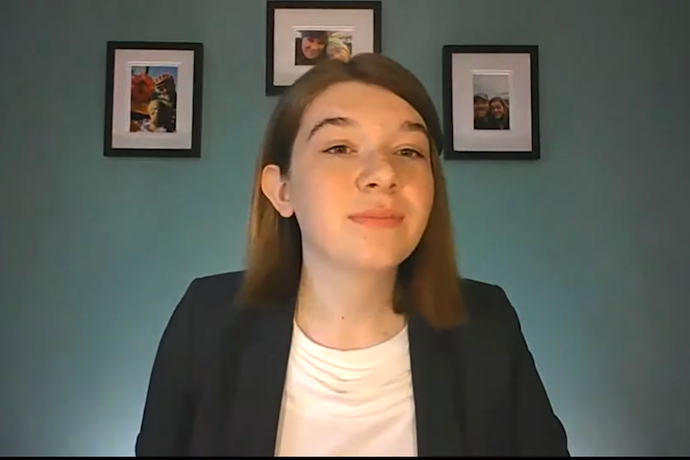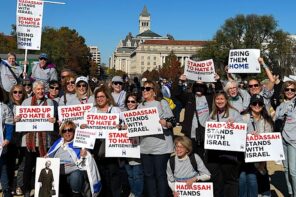Last month in Louisiana, my home, a member of our state legislature introduced legislation designed to make it difficult for transgender young people to get physical and mental health care because of their gender identity.
The story stunned me—my morality, faith, and patriotism. It also reminded me of the powerful testimony recently delivered to Congress in the first ever hearing on the Equality Act, legislation that would provide consistent federal non-discrimination protections for LGBTQ+ people and strengthen existing civil rights laws.
Pro-equality activists, including an expansive coalition of faith leaders, for decades have been pushing for such a hearing. The breakout star of the hearing, however, wasn’t a longstanding leader of the LGBTQ+ equality movement, but 16-year-old Stella Keating, the first transgender teenager to testify before the U.S. Senate.
Stella shouldered the burden of speaking for her community with aplomb. But part of me was horrified that we as a nation had forced Stella to carry this burden at all. What kind of country makes a 16-year-old appear before Congress to plead for her rights as a human being?
As a person of faith and religious leader, I embrace the historic meaning of what is called “the gospel of Christianity” as” good news,” which moves me to share my faith lovingly and devote myself to service for others. Never am I comfortable religiously, conscientiously, or constitutionally when I am confronted by ugly laws aimed at diminishing the LGBTQ+ community—including Stella and young people like her—especially when routinely and disingenuously these laws are proposed in the name of religion. Of my religion.
Twenty-eight states are currently considering anti-trans bills, and three states—Tennessee, Mississippi, and Arkansas—have already signed legislation into law. My own home of Louisiana now is in danger of joining this anti-life legislation. These laws, written by adults in order to pick on children, are perpetrated in the name of religious freedom. As someone who has spent his life in the clergy working in close collaboration with people of many different faiths and good individuals with no faith, allow me to set the record straight: political nonsense spun by people who view other people as less than human have no place in our nation and its constitution.
Religious freedom, guaranteed by the First Amendment, was never intended to deny any person human rights. Time and again, people who have no idea about the meaning of religious freedom try, in the name of religion, to abolish civil rights for people of color; to deny immigration rights for members of minority religions or no religion; to take money from the education system to build schools that teach religion but not civics; and to claim that a person’s belief should supersede the freedom and justice promised by our Constitution.
Indeed, for many believers, our faiths demand that we join against any attempt at unjust discrimination. Central to a wide variety of faith traditions is the principle of respect and dignity afforded to every person.
The Bible is to be read holistically, neither fragmentally nor in isolation. A passage of the Holy Book read alone can be scriptural but not Biblical. Only when a scripture is consistent and resonant with the overarching truth of the Bible in its entirety does that reading have spiritual authority. The truth of the Bible always affirms a message of love and acceptance to all people. My commitment to honoring members of the LGBTQ+ community is rooted in scripture, not in spite of it.
In fact, across religious traditions, people of faith in this country broadly support laws protecting LGBTQ+ people from attack or discrimination. While anti-LGBTQ+ activists might be eager to talk about transgender people as a fringe group looking for special treatment, the vast majority of us know better. Trans people exist everywhere. They’re community members, coworkers, neighbors, friends and family. They are God’s people as much as anyone else in the world.
This past week one of my grandsons posted on his Instagram: “I think everyone deserves their own rights to be who they want to be and I love it. You do not have to fear about who you are or who you want to be. I am proud of you and I respect you.” I told my young autistic grandson how proud I was of his insight, wisdom, and compassion. He understands the importance of both civil rights for all people and the nature of true love—why can’t adults in public office be so committed to a better world?
Working for equality fosters in all of us the kind of citizenship that drives a nation characterized by good neighbors, mutual respect, and empathy. By championing the rights of those historically marginalized in American life, we affirm the dignity and worth of every person and continue the difficult work of making the promises of our Constitution a reality.
That’s why each of us, from every faith or no faith, have a responsibility to raise our voices and follow the lead of courageous young leaders like Stella and my grandson. After all, you’re never too young or old to stand up for what’s right.





